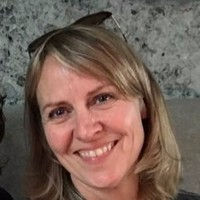Ambassador Thomas Winkler on “Canada and the Kingdom of Denmark in the Arctic"
- Hilde Huus
- Feb 28, 2019
- 4 min read
Ambassador Winkler with CNS President Karin Birnbaum

When you head out into a cold February evening in Ottawa to hear an ambassador speak, you expect to learn something interesting about their country, perhaps its history and its approach to solving international problems, delivered by necessity in diplomatic tones. I have to say that the Kingdom of Denmark’s Ambassador to Canada, His Excellency Thomas Winkler, delivered much more than that in his talk on February 20. The 40 or so guests who attended were perhaps a little surprised and certainly very impressed by his very compelling and engaging talk.
Ambassador Winkler has been dealing with Arctic issues as a lawyer since 2007, in particular with regard to sovereignty. He is the author of the 2008 Ilulissat Declaration by the five coastal states of the Arctic Ocean (United States, Russia, Canada, Norway and The Kingdom of Denmark), intended in part to block any new comprehensive international legal regime from governing the Arctic Ocean and to ensure the orderly settlement of any possible overlapping claims. If this sounds important but perhaps a little dry, I would point out that his most recent ambassadorial posting was a five-year tenure as the Kingdom of Denmark’s Ambassador to Russia, working with Russian officials in the Arctic during what he described as “complicated times.” You may recall, for example, that in 2007 a Russian citizen planted the Russian flag on the seabed of the Arctic Ocean at the North Pole.
The Ambassador reminded the audience that the Kingdom of Denmark includes Greenland and the Faroe Islands. He was frank regarding political difficulties between Denmark and Greenland, mentioning the 2018 tensions over Greenland’s desire to build new airports in Greenland, and China’s offer to finance them. When Copenhagen stepped in and offered to finance them instead, Greenlanders demonstrated against what they saw as an exercise of colonial power. Ambassador Winkler noted that Greenlanders have a strong sense of identity supported by a single common language and a clearly defined territory. He stressed that sensitivities between Greenland and Denmark must be taken into account when dealing with Arctic issues.
In spite of such ongoing sensitivities, the Kingdom of Denmark was able to forge its Strategy for the Arctic 2011-20, which is supported by Greenland and the Faroe Islands. It is due to expire next year, and a new strategy is already in the works. Denmark’s Arctic priorities include peace, security, and safety. Global tensions can spill over into the Arctic and more military forces are being posted in the area. With more traffic passing through the Arctic, countries must ensure that they have the ability to rescue people in cases of emergency. Self-sustainable growth and development are also priorities. It is a very complicated equation to ensure development while respecting climate, nature, and indigenous ways of life and Ambassador Winkler noted that much discussion and a lot of resources are focused on these issues.
All of the Nordic countries plus Canada, Russia and the United States belong to the Arctic Council, which addresses issues faced by the Arctic countries and the indigenous people of the Arctic. International treaties have been agreed to for all of the countries involved and they are working well, said Ambassador Winkler. The Council is also dealing with practical issues such as the challenges of communicating across the Arctic. Ambassador Winkler stressed that people to people contact is what really counts in resolving issues. The different factions with interests in the Arctic need to know each other well in order to avoid conflicts. There is also the viewpoint of the south towards the north to consider. Does the south really care about the north? Certainly Denmark showed its solidarity to its Greenlandic citizens when a tsunami hit in 2017.
Ambassador Winkler also spoke about the Canadian Arctic, noting that there is a need for more infrastructure. For example, there are currently no transportation links between our Arctic and Greenland. Canada has, in general, a complicated relationship with both Russia and China, and this is also true with regard to their dealings in the Arctic. China is not an Arctic state, but would apparently like to establish itself as a “near-Arctic state.” He noted that Denmark and Canada have a strong, common political approach on values and priorities with regard to the Arctic.
Of course the Danish Ambassador could not discuss Canada, Denmark, and the Arctic without mentioning Hans Island. Anyone who follows the Canadian Nordic Society’s Facebook page has likely seen comical postings about this small chunk of rock that lies in the strait between Greenland and Canada’s Ellesmere Island, and is claimed by both countries as their own territory. The Ambassador showed us the weather-battered remnants of a Danish flag from Hans Island that was delivered to him. Apparently, when Danish military visit the island, they leave a bottle of Schnapps and when Canadian military forces come there, they leave a bottle of Canadian Club whiskey, and they replace each other’s flags with their own. The Ambassador assured us that this particular international conflict is in the process of being resolved in a civilized manner.
If the number of questions a speaker receives is an indication of their success (and in this case I think it definitely was), then the Ambassador was certainly one of our very best.




Comments